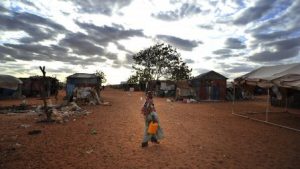Global Response Mechanism for the Climate Crisis Needed
In the post-pandemic world, people must demand for a bold and urgent global response mechanism to prepare for the climate crisis.
COVID-19 has been called “climate change at warp speed”. As the consequences of climate change are expected to be more catastrophic than the ongoing pandemic, the risks of being ill-prepared can no longer be an option.  We must aim to enhance and strengthen the global policy response to climate change by learning from the present crisis. Towards this goal, crucially, we need to first develop an understanding of the gaps in our pandemic-response mechanism and then, attempt to address them in order to build a climate-resilient society.
We must aim to enhance and strengthen the global policy response to climate change by learning from the present crisis. Towards this goal, crucially, we need to first develop an understanding of the gaps in our pandemic-response mechanism and then, attempt to address them in order to build a climate-resilient society.
Lessons from COVID-19
The pandemic’s most crucial lesson – one that resonates worldwide – is that early action is invaluable. Had the United States imposed social distancing measures a few weeks earlier than it did in March, at least 36,000 fewer lives would have been lost. The UK government’s lockdown timeline carries the same lesson: “failure to go into lockdown earlier…has cost a lot of lives.” Many counties were tragically delayed in taking decisive and critical steps such as improving lockdown provisions and social distancing measures at an early stage.
Likewise, warning bells have been ringing loud and clear on climate change for about two decades now. These have, unfortunately, not deterred big corporations and politicians into taking preventive measures. Earlier this year, UN Secretary General António Guterres warned that we are currently “way off track” to meet either the 1.5°C or 2°C targets determined in the Paris Agreement. While we may no longer be able to prevent the climate crisis altogether, bold, immediate and aggressive measures will enable us to restrict the intensity and extent of damage. Elizabeth Sawin, co-director of a think-tank working on climate change, stated that “the pandemic and the climate crisis are problems of exponential growth against a limited capacity to cope”. This means that as in the case of the virus where the number of infected people can overburden health care systems, in climate change the rate of emissions growth will overwhelm our ability to manage disasters. Even while the consequences of coronavirus are tangible in the immediate present, the idea is the same: “If you wait until you can see the impact, it is too late to stop it.”
This brings us to the second lesson – adaptation is not enough. When dealing with crisis, adaptation and innovation are necessary to overcome problems. However, these measures cannot be celebrated as solutions to widespread human suffering in the midst of a global crisis, which is a result of a lack of preparation in the first place. Recently, we witnessed train compartments and stadiums be converted into isolation wards, face masks being made at home, and even experiments with home-based alternative solutions to sanitisers. Such steps can help soften the impact of the damage. However, in the case of climate change (and ideally any crises), our goal should be to first strive to prevent the occurrence of the crisis, and only upon failing to do so, try to minimise the damage.
Fast-evolving climate adaptation measures are no different. Development of drought-tolerant crops, construction of seawalls to protect coastal communities, and adoption of energy efficient codes for urban infrastructure, aim to address, to use medical terminology, the symptoms of climate crisis.
Also Read : Land and Climate Change: Critical Correlation and Impacts
However, since these actions do not properly address the root causes of the global climate problem, they will be largely ineffective. Therefore, to state the obvious, preventive approaches aimed at climate mitigation such as emissions reduction must take precedence over adaptation measures in the global development agenda.
Moving forward, policy response to climate change must envision actions on the basis of fairness and urgency, even if such measures border on alarmism. As it is, political leaders and countries have set woefully inadequate targets that continue to impact the environment. And despite drafting weak plans, our efforts still fall short. Equally, the incompetence of institutions like the UN Security Council and WHO to predict the scale of the coronavirus crisis, determine risks involved, and prepare a response strategy, reveals their inability to provide leadership in times of global crises. We are wholly dependent on systems which meet irregularly, in places that are least likely to be affected by climate change, to fix targets for the next decade, and then return to business-as-usual. COVID-19 was not an unusual risk. It had been predicted and was inevitable. Yet, the world’s leading institutes and systems were unable to draft an adequate response mechanism.
Way Forward
There is much to consider in the post-pandemic world. But where do we begin? The answer makes itself evident when we look for what –or rather who– is most crucial in the fight against climate change. Both, in COVID-19 and climate change, there is an unparalleled role for the science community. Before the pandemic occurred, certain politicians the world over alleged that climate change is a hoax, a conspiracy theory and whatnot. Science and politics had reached crossroads. However, the pandemic has ushered in an opportunity for change.
 Earlier this year, at the Petersburg Climate Dialogue XI, the German Federal Environment Minister confessed that “we are learning to listen to scientists.” This provides a new opportunity to address the climate crisis. So, how can the science community make its contributions more definitive? By making its research outcomes clear, succinct, accessible and contextualised, to have engagement with and impact on policy and action. There is immense value in encouraging scientists and policymakers in a cooperative space. This will be beneficial not just for policymakers, but also for the scientific community, which will be able to exercise more influence on the nature and course of everyday politics and society.
Earlier this year, at the Petersburg Climate Dialogue XI, the German Federal Environment Minister confessed that “we are learning to listen to scientists.” This provides a new opportunity to address the climate crisis. So, how can the science community make its contributions more definitive? By making its research outcomes clear, succinct, accessible and contextualised, to have engagement with and impact on policy and action. There is immense value in encouraging scientists and policymakers in a cooperative space. This will be beneficial not just for policymakers, but also for the scientific community, which will be able to exercise more influence on the nature and course of everyday politics and society.
This brings us to the role of policymakers, who are responsible for acknowledging scientific developments and utilising them for societal well-being. For instance, research has repeatedly shown that the issue of climate change fails to gain momentum with the general public, as it seems psychologically distant and abstract. This is evidenced by an average person’s inability to accurately identify or regard climate change as a real-phenomenon—through the use of their everyday tools of observation– despite the significant environmental, social, and economic costs involved.
This is so because learning from statistical descriptions involves analytical processing which is not only slow and complex but also requires deliberate cognitive effort, while people often rely on learning from personal experience which involves fast, intuitive processes.
Also Read : Forest conservation: Two steps forward, four steps back
For these reasons, psychologists suggest that the most impactful way for people to understand the consequences of climate change might simply be to experience them. This course of action, however, is undesirable. The next best step is to attempt to close the psychological distance through communications and behaviour-change strategies. How can this be implemented? Well, policymakers and climate change activists need to utilise this research outcome and attempt to personalise the issue by sharing intimate stories about a single, personally salient victim or community, to bridge the psychological gap. People are far more likely to alter their behaviour when they are shown proof of environmental risks in a way that is personal and directly appeals to their beliefs and values. Not all of us care about bushfires in a distant land, say Australia, but most of us tear at the sight of the burnt Koala bear and want to help.
This brings me to the final point: COVID-19 has shown that people are at the root of the solution. Our response, aspirations and expectations are what lay the stepping stones for political response. In preparing for climate change, intra- and inter-generational solidarity will play crucial roles. As global warming rises, our future generations will struggle for survival. Therefore, we have to actively involve ourselves with the issue and work alongside non-governmental organisations (NGOs) to help build resilient communities, press policymakers and governments to commit to sustainable processes. We may be less informed about climate change, at present, but COVID-19 has shown how rapidly and enthusiastically we can learn and take action. Hence, it would be wise to not delay our engagement to the point of inflection.
Finally, there are some who argue that it is naïve to look for a silver-lining in this pandemic which has impacted both lives and livelihoods. But we owe efforts to not only other species and the planet, but also to ourselves –to the resilience and imagination of our previous generations, and to the pragmatism and optimism of our future ones. Besides, it is these human-qualities that can help us navigate through crises like they have done in the past. A possible silver-lining lies in the lessons we take from the pandemic to inform our future policy and action to minimise the impacts of the climate crisis.
(Slider Image credit: Applebox.media)
